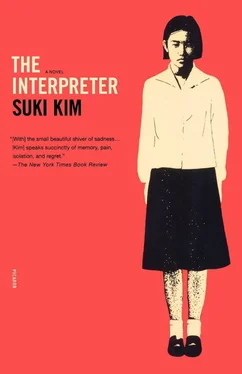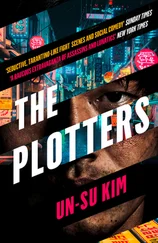Suki Kim - The Interpreter
Здесь есть возможность читать онлайн «Suki Kim - The Interpreter» весь текст электронной книги совершенно бесплатно (целиком полную версию без сокращений). В некоторых случаях можно слушать аудио, скачать через торрент в формате fb2 и присутствует краткое содержание. Город: New York, Год выпуска: 2011, ISBN: 2011, Издательство: Picador, Жанр: Детектив, Триллер, на английском языке. Описание произведения, (предисловие) а так же отзывы посетителей доступны на портале библиотеки ЛибКат.
- Название:The Interpreter
- Автор:
- Издательство:Picador
- Жанр:
- Год:2011
- Город:New York
- ISBN:0-312-42224-5
- Рейтинг книги:3 / 5. Голосов: 1
-
Избранное:Добавить в избранное
- Отзывы:
-
Ваша оценка:
- 60
- 1
- 2
- 3
- 4
- 5
The Interpreter: краткое содержание, описание и аннотация
Предлагаем к чтению аннотацию, описание, краткое содержание или предисловие (зависит от того, что написал сам автор книги «The Interpreter»). Если вы не нашли необходимую информацию о книге — напишите в комментариях, мы постараемся отыскать её.
The Interpreter — читать онлайн бесплатно полную книгу (весь текст) целиком
Ниже представлен текст книги, разбитый по страницам. Система сохранения места последней прочитанной страницы, позволяет с удобством читать онлайн бесплатно книгу «The Interpreter», без необходимости каждый раз заново искать на чём Вы остановились. Поставьте закладку, и сможете в любой момент перейти на страницу, на которой закончили чтение.
Интервал:
Закладка:
I would’ve recognized you anywhere, your sad eyes, the ones marked for tragedy, your nose is emotional, the angle tells me so, your forehead is high like mine, you’re ambitious like me, your lips are too small for your face, so imperfect and afraid, you’re a beauty full of holes.
Suzy lay still and watched the peeling of her skin with wonder. She had just turned twenty. It seemed miraculously natural, and Damian the wrong man for the job. Afterward, she shuddered at the possible consequence of this love, if that is what it really was. She was not sure if she was frightened or excited at the prospect. Their lovemaking was an escape. It was passionate certainly, not in the usual lusty way, but with a fierce current of sadness, for they both knew that they would be alone at the end of each other.
People later said that Suzy was the precocious thing who ruined the most celebrated marriage of academia. Damian Brisco, the foremost expert on East Asian art, and his wife, Yuki Tamiko, the renowned translator of the newest edition of The Tale of Genji . Some blamed a midlife crisis, how Damian, at forty-nine, seemed to have lost his head over a mere student at the expense of his career, which had been crucial for everyone, including himself and his marriage. The couple had collaborated on many groundbreaking studies. They were the authors of the three volumes of East Asian Art and Literature , which was the main text for every university’s Asian-civilization course. Most agreed that their marriage catapulted the field of East Asian studies, which up until their prolific partnership had been in a vacuum. Although it was Yuki Tamiko who held the chair position in the East Asian Department at Columbia University while Damian Brisco took an extended leave to work on the fourth and final volume of the text, it was clear that any major decision had to pass through both. Their names were forever linked together, always in the context of “edited, researched, compiled, translated, written by Brisco and Tamiko.” Their joint lecture series on “Trekking Buddhist Art Through East Asia” was immensely popular, and their marriage admired by those in the field as the perfect union between East and West.
But Suzy knew otherwise. She had been one of Professor Tamiko’s advisees since the beginning of her junior year. Yet it was nearly impossible to get Professor Tamiko in person. Twice a semester, Suzy was supposed to meet with her to discuss her impending thesis, but so far, she had been greeted by a different TA each time, someone who seemed merely a few years older than Suzy herself, and rather flustered at having to advise anyone at all when his own dissertation lay forgotten somewhere between the hands of the university’s bureaucratic committees. She saw her in lectures, of course. Postwar Japanese Fiction was one of the few standing-room-only classes on campus, and even though Suzy had actually registered for the class whereas half the attendees seemed to be auditors, she was always stuck at the farthest distance from the podium, on which stood Professor Tamiko, whose profile seemed almost ethereal.
It was true that she was beautiful. Yuki Tamiko was stunning. At forty-nine, she had retained much of the delicate-boned, high-cheeked, ultra-slender, and immensely haughty girl whom Damian Brisco had met at Harvard when they were both freshmen. The coy-girl beauty might have long passed the woman, but there was something regal in its place, something strikingly soft and compassionate and yet impenetrable, edged by the vastness of her knowledge as she stood before the hundreds of eager minds and recited lines from Mishima’s The Sea of Fertility as though Western scholars had done the most unthinkable injustice by declaring Ulysses the ultimate fiction when the real thing lay shrouded in this Japanese tetralogy, which cast its spell over everyone in the auditorium while she, Yuki Tamiko, towered from her highest ground, suddenly demure and fiercely competent. Everyone was at her mercy. The boys looked up at her with awe and admiration—Yuki Tamiko was not the sort of woman one dared to have a crush on—and the girls marked her every word in their spiral notebooks in red ink with double exclamation points, as though everything would be different now that they knew what they had not realized merely fifty minutes ago, when their literary scope lacked the passionate breadth of that remarkable woman up on the podium. Suzy, however, remained untouched. The lecture was perfect, and Professor Tamiko’s seductive banter mesmerizing, but Suzy felt somehow left out. There was a twinge of coldness that Suzy sensed in the older woman’s face, guarded by the finest words of Japanese literature. Suzy felt claustrophobic and was struck by a distinct desire to get up and walk out. It was during one of these rash walkouts that she saw Damian for the first time.
She had slipped out the door and skipped down the steps facing Dodge Hall when she sensed that she was not alone, that another person had just taken the same steps and was walking behind her. Resisting the temptation to turn around and look, Suzy kept on walking. It must have been April. The first two weeks of April were always deadly. Finals were just on the way, the summer was around the corner, and a strange mix of excitement and panic spread through the campus as students crammed for exams. It had rained for a week straight, and the afternoon looked unnaturally bright. And it was during these nervous hours that Suzy, instead of returning to her dorm room, turned right onto Amsterdam Avenue. Now a few more people were on the street, mostly campus people still, but a bit older, because beyond the actual gates of the campus, yet still within the ten-block radius of 116th Street, most passersby were graduate students or school employees or faculty family. All seemed to be hurrying, although it was Friday afternoon, and the rain had finally ceased. Suzy ambled with not much feeling at all, or with so much feeling that she felt breathless. This extreme ennui came upon her with no warning, a dark hand moving onto her heart. Sometimes she would suddenly get up and leave, even though Professor Tamiko’s lecture was faultless and there was no reason for such an impatient exit.
Along Amsterdam Avenue there were two usual stops for wandering, restless undergraduates—St. John the Divine and the Hungarian Pastry Shop. The former was more a construction site than a cathedral, under renovation for as long as anyone could remember. Although it was one of the largest cathedrals in the world, its imperfection, Suzy thought, was really what soothed and attracted visitors. There was something oddly comforting about a cathedral whose façade was forever being repainted or repositioned. She liked sitting on a pew while listening to the usual banging of hammers and drills coming through the stained-glass windows. She hoped that the cathedral would never get done, that it would always remain half finished with steel wires sticking out. God had problems too, Suzy thought, and his cavernous sanctuary was a mess. God belonged more in the café across the street. It was the typical underground hangout often found in college neighborhoods, where goateed boys and handknit-sweatered girls sipped their refills of double Hungarian, which was a shot of espresso with a squirt of amaretto, and discussed the usual suspects—Derrida, Kierkegaard, Wittgenstein, even Said—although for a break they might bring up Woody Allen, whose latest film had been shot in this very café only a few weeks ago; they agreed that it sounded rather dull—a middle-aged professor falling for one of his students—so typical, so jaded, so hopelessly redundant that they all got tired of talking about it, and the conversation shifted right back to Derrida.
But Suzy entered neither that day. She was about to, and then something stopped her. She had climbed the steps to St. John the Divine when she became aware of the man next to her. He had been walking behind her; although she could not see his face, she knew he was there all along. And then, suddenly, he was on her right, almost directly parallel, facing the entrance of the cathedral. The entrance was wide enough for two people to pass without having to impose on each other, and she feared it was an aggressive gesture from a stranger who seemed to have followed her all the way from the lecture. She was cornered, and was left with no choice but to turn and face him.
Читать дальшеИнтервал:
Закладка:
Похожие книги на «The Interpreter»
Представляем Вашему вниманию похожие книги на «The Interpreter» списком для выбора. Мы отобрали схожую по названию и смыслу литературу в надежде предоставить читателям больше вариантов отыскать новые, интересные, ещё непрочитанные произведения.
Обсуждение, отзывы о книге «The Interpreter» и просто собственные мнения читателей. Оставьте ваши комментарии, напишите, что Вы думаете о произведении, его смысле или главных героях. Укажите что конкретно понравилось, а что нет, и почему Вы так считаете.












